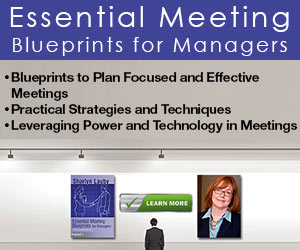An HR pro recently told me, “I’m in charge of employee motivation.”
I hate to burst anyone’s bubble but I’m not sure that (1) any single person or department can be in charge of motivation and (2) the responsibility for employee motivation should belong to human resources.
On some level, aren’t we as individuals in charge of our own motivation? We should understand what motivates us – who better? And I don’t mean money, a corporate expense  account or the window corner office. I mean what gets us excited about work; what drives us to do things.
account or the window corner office. I mean what gets us excited about work; what drives us to do things.
Once we understand what motivates us, then isn’t it our responsibility to tell our manager? Sometimes I wonder if people get so focused on the money, extra time off and the perks that they forget to tell others what drives them. Then, the work becomes boring and mundane. And the company is shocked when an employee decides to leave. The manager fought hard to get the employee the money and benefits they asked for. They didn’t know they were supposed to make the work more interesting and exciting – because the employee didn’t tell them.
After an employee shares what motivates them, it becomes part of a manager’s responsibility to make sure the employee gets work assignments that motivate them. Now this might not be all day, every day. Maybe it’s a special project or a particular task. But managers create work every day. Making sure they match the work with the individuals who are motivated to do it is essential.
Where I would see human resources stepping in is to encourage managers and employees to have the conversation about what motivates them. And helping managers design work that will motivate employees. But I’m not sure that translates into being “in charge” of motivation.
Over the years, the responsibility for employee motivation has become a rather philosophical debate. Tell me your thoughts:
Who is ultimately in charge of employee motivation?
What role should HR play, if any, when it comes to employee motivation?
I’m interested to hear your comments on this.
Image courtesy of Amy Loves Yah







Paul Hebert says
Whoever the HR pro is that told you they are in charge of motivation – they are dead wrong.
As you said – motivation is something the individual either has or doesn’t have. It is all internal. Now the HR person may be in charge of training and educating managers and supervisors on how to recognize and ferret out what are the key things each employee finds motivational (hint: it ain’t crystal bowls and lapel pins.)
I have this discussion every day it seems.
The big issue is that people mistake “incentives” for motivation. Incentives are not motivation. Incentives are decision criteria. You can provide an incentive and the person then makes a decision if the incentive warrants changing their behavior. They are influenced by the incentive but that still isn’t motivation (in the sense we’re talking.)
Motivation is more nebulous. And transient. I can be motivated (internally) one day to focus on some very mind-numbing task that I want to personally get through for some sense of accomplishment. Or I might be motivated another day to work with a team to accomplish something that increases my knowledge base. In either case – I’m the one that has the motivation.
If we stop thinking about motivation as something you do to other people and start thinking about how I can provide an environment that allows people to make decisions on what to do and how to do it – now we’re talking about what HR is in charge of.
HR is in charge of understanding how humans make decisions and finding ways to enable the environment (either through better managers, better tools, better education) to help people make decisions on where to spend their time and energy. People naturally gravitate toward things they are good at and that give them pleasure (i would call that motivation.)
At most companies motivation isn’t the issue. In fact, most great companies don’t provide motivation at all. They provide space – they get out of the way and allow the people to do the things that motivate them.
Kinda counter-intuitive. But if you want motivated employees – just make the place they work more accommodating for them to be motivated. Stop trying to “do motivation” and start doing more enabling (within reason – we’re not building co-dependent relationships – we’re building companies.)
If you had a child who showed interest in, and a talent around say – art. Would you place that child into situations that required sequential activities with attention to detail? Probably not. You’d make sure they had a space to let their mind run free. They will find the motivation in that environment to create. Employees are no different.
So… long answer to your question – you’re right.
Cheers and have a great day!
Kent Kniebel says
A manager is in charge, as they are most directly able to impact motivation on a day to day, positively or negatively. As Paul mentioned, HR should support management through tools and education. Most managers aren’t born, or born motivators. Expecting them to manifest skills on their own is setting the bar too high.
Penny Jimison says
I absolutely agree. I worked for a company that taught two core classes. One was managing your career for employees, the other was basics in coaching employee performance for managers.
In the employee course we taught employees how to prepare for a performance appraisal throughout the year including how to approach your supervisor for that all-important talk about where you wanted to go and ask for help on getting there. Set measurable and attainable goals (with and without the boss) track successes and critical incidents, and ask for an informal mid-year review to see how you were doing.
For managers, we taught how to coach and handle employee feedback, goal setting and career tracking opportunities in the workplace. I would have liked to have seen this course expanded to include building trust and a learning environment in your department.
Sharlyn Lauby says
Thanks so much for the comments. Very interesting conversation.
@Paul – Totally agree there’s a huge difference between incentives and motivation. And that’s where the confusion lies. I like your analogy regarding the child and art.
@Kent – Your comment about HR being able to support management via education is spot on.
@Penny – Thanks for sharing. Nice training outline and it sounds like they produced results.
Laura Schroeder says
I agree HR shouldn’t be seen the motivation fairy – in fact, seeing someone else as the captain of your motivation ship may be the definition of unmotivated. But I’d like to see HR taking a more proactive stance on manager quality and capability.
Sharlyn Lauby says
Excellent point Laura. Thanks for sharing!